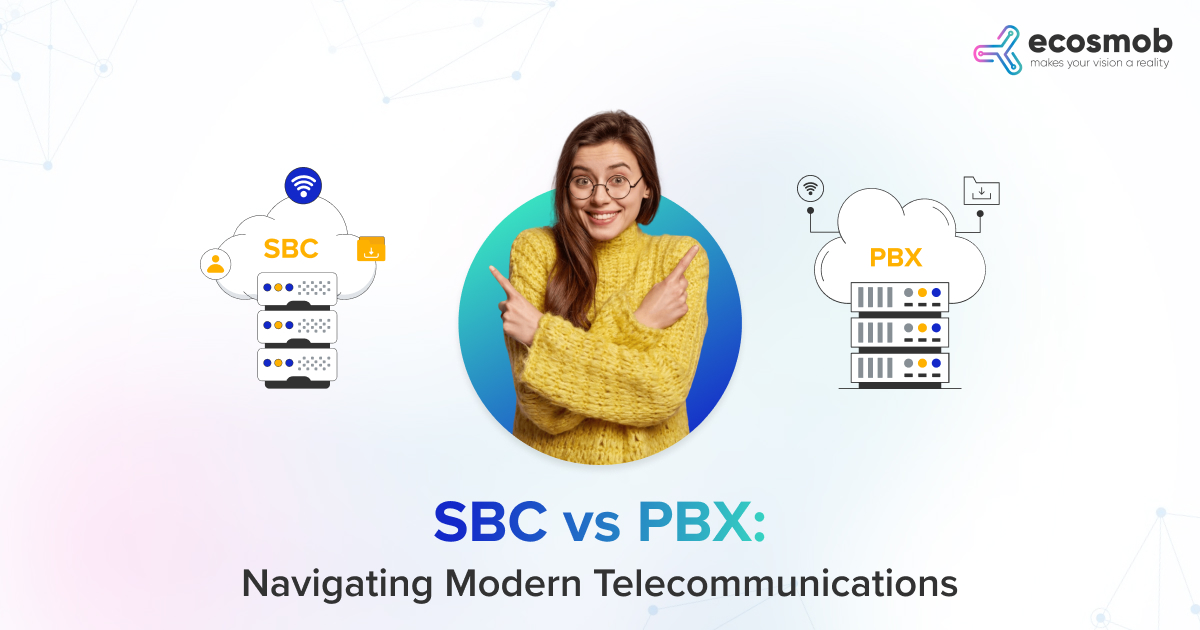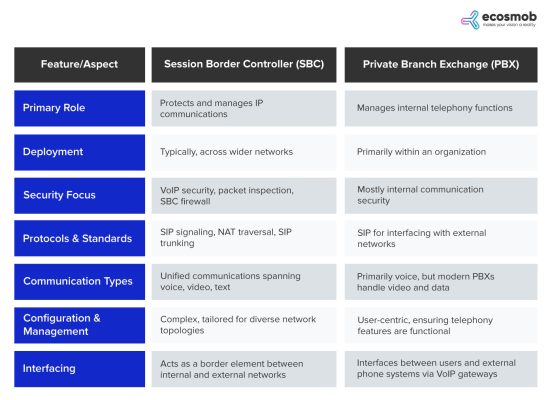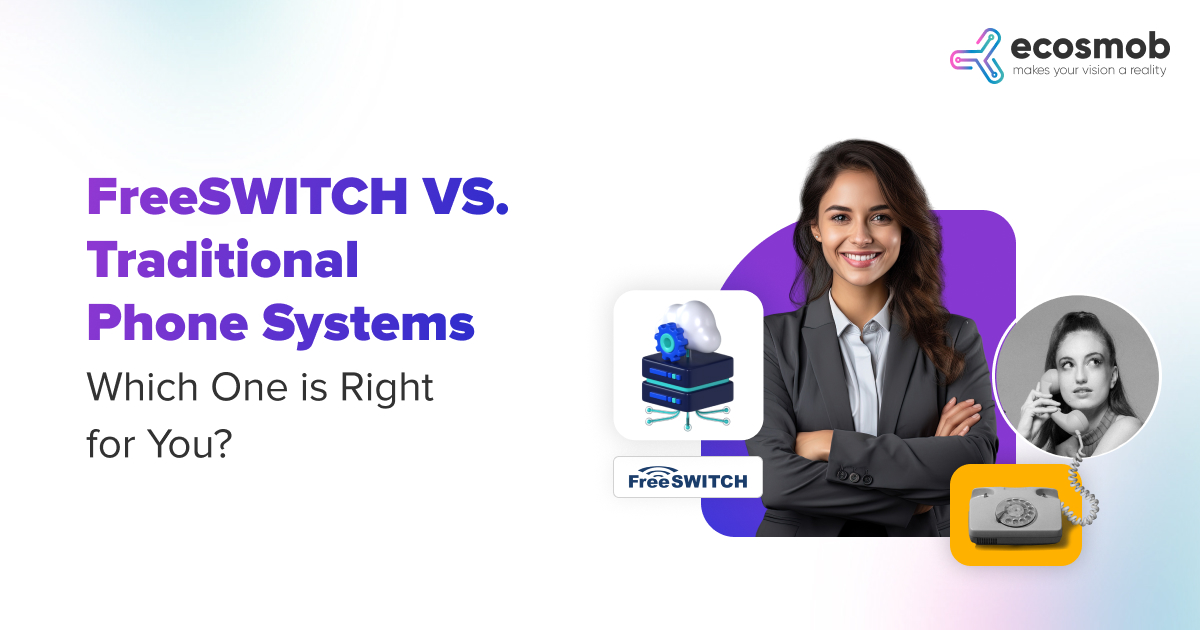Telecommunications has experienced monumental growth and evolution over the past few decades, ushering in an era of digital transformation and technological innovation. In today’s world, efficient and secure communication is the lifeblood of businesses and individuals.
The leading figures in this domain are the Session Border Controller (SBC) and Private Branch Exchange (PBX). Both have seen significant improvements in their capabilities. They have adapted to the evolving requirements of modern communication.
Let’s explore the differences between SBC and PBX to understand their roles, features, and unique contributions to today’s communication standards.
Stay ahead of cyber threats. Explore the protective features of SBC solutions! Get Started
Session Border Controller (SBC)
The Vanguard of Modern VoIP Systems
The Session Border Controller is more than just another term in the vast lexicon of telecommunications. Think of it as the vigilant gatekeeper, overseeing and facilitating the seamless transit of voice and video calls between an enterprise and its carrier service. It is like a router between the enterprise and the carrier service, ensuring that voice and video calls are transported without glitches.
Over the years, SBCs have evolved to assimilate cutting-edge features, adapt to Unified Communications, and, most importantly, fortify VoIP security protocols. During the 2022-2032 period, the global SBC market is expected to grow at 5.4% CAGR, valued at USD 1200 million.
With businesses increasingly moving to internet-based communication, the need for SBC technology is more pronounced than ever.
SBC Features
Network Security
Given the rising cyber-attack incidents targeting VoIP systems, the focus on network security is paramount.
One of the pivotal functions of an SBC is to offer robust VoIP security. SBC security measures, including firewalls and detailed packet analysis, represent only a fraction of the comprehensive protective systems integrated within SBCs.
The primary role of SBC solutions is to scrutinize every packet of data, analyze its legitimacy, ensure NAT traversal, and detect any anomalies or potential threats.
SIP Trunking and Call Handling
When we talk about SIP or Session Initiation Protocol, think of it as the backbone for voice, video, and messaging communication over the Internet. In simple terms, it’s like the rules and procedures your devices follow when they want to “talk” to each other online.
One key term you might often encounter in this space is ‘SIP trunking.’ It’s a method that lets businesses connect their internal phone systems to the outside world using the Internet rather than traditional phone lines. What makes SIP trunking special? It’s all about making communications smoother and more streamlined.
Enter SBCs or Session Border Controllers. They play a crucial role in this process. With their advanced capabilities, they act as guardians or managers of these SIP communications. From the moment a call or session starts until it ends, SBCs ensure everything runs smoothly. They manage the technical details, ensuring real-time communication, whether a voice call or video chat, happens without a hitch.
Unified Communications
The realm of communication today transcends just voice. We’re talking about voice, video, instant messaging, and even file transfers. SBCs act as the bridge, guaranteeing that each fragment of this communication spectrum is relayed with unparalleled Quality of Service (QoS).
Customizable Deployment
Every business is unique, and so are its needs. SBCs, with their flexibility, can be adapted to various network configurations, be it cloud-based or on-premises, ensuring a seamless SBC configuration.
Simply put, no matter how your business’s technical side is structured, an SBC can be custom-tailored. It’s all about ensuring a smooth and efficient configuration that’s just right for your unique needs.
Integrate voice, video, and data effortlessly with custom PBX solutions! Get In Touch
Private Branch Exchange (PBX)
The Orchestrator of Internal Communication
If SBC is the gatekeeper, then the PBX is the internal maestro, ensuring that each communication within an organization occurs seamlessly.
A Private Branch Exchange (PBX) is a private telephone network used within a company or organization. Traditional PBX systems might be familiar to many as the office phone system, but today’s IP-PBXs are far more versatile and internet-driven. It allows internal communication between users and manages external calls, connecting to the public phone system.
During the 2018-2028 study period, PBXs are forecasted to grow at a CAGR of 15.20%.
PBX Features
Call Management
PBX solutions excel in call control. They handle the very basics of telephony: making, receiving, transferring, and holding calls. Advanced systems offer features like voicemail-to-email, intuitive auto-attendants, expansive conference call capabilities, call queue management, and detailed analytics.
VoIP Gateway
The VoIP gateway functionality in modern PBXs offers an interface between traditional telephony networks and internet-based VoIP systems.
Gone are the days when PBX systems operated in isolation. Today, they seamlessly connect with external networks using the SIP protocol. This ensures efficient management of SIP-based communications and smooth control over communication sessions inside and outside organizational boundaries.
Real-Time Communication
Much like the SBC, PBXs also focus on delivering real-time communication efficiently. This encompasses not just voice communication but video, data sharing, and instant messaging, too.
With enhanced real-time communication capabilities, PBXs ensure that the demands of tomorrow’s communication landscape are addressed today.
Session Management
PBXs do more than just handle individual calls. Their sophisticated call control mechanisms ensure internal and external communication sessions run smoothly without interruptions.
SBC vs PBX
Scope and Functionality
While the SBC is primarily geared towards ensuring the safe and efficient transit of VoIP communications across networks, the PBX is more user-centric, providing telephony features to end-users.
Deployment
SBC deployment typically involves intricate configurations for VoIP traffic, ingress and egress control, and more. PBX systems, meanwhile, are more about ensuring user-level features, such as call directories or voicemail functionalities, are up and running.
Security and Border Control
The SBC, as its name suggests, acts as a border controller or border element, ensuring that all communications entering or leaving a network are secure and authenticated. PBXs, while also security-conscious, prioritize the seamless flow of internal communications.
Protocols and Communication Standards
Both systems interact heavily with protocols like SIP. However, while the SBC is more involved in SIP signaling, handling SIP trunking, and ensuring NAT traversal, the PBX leans on SIP mainly for interfacing with external networks.
A Quick Look at SBC vs PBX
Final Thoughts
Grasping the differences between SBC and PBX empowers businesses and individuals to make knowledgeable choices, guaranteeing that their communication frameworks are solid, streamlined, and prepared for the future.
Both Session Border Controllers and Private Branch Exchanges are fundamental to modern telecommunication systems. While SBCs ensure the secure and efficient transit of IP-based communications, PBXs ensure that users have the tools and features they need for everyday communication.
With the rapid evolution of technology, one thing is clear: tools like SBC and PBX are here to stay, continually adapting to serve the ever-changing demands of global communication.
At Ecosmob Technologies, we believe in empowering businesses with tools that aren’t just cutting-edge but also tailored to unique needs. Whether you’re looking for a robust custom SBC to fortify your IP communications or a flexible custom-hosted PBX solution to enhance internal telephony functionalities, we’ve got you covered. Discover the future of telecommunications with Ecosmob!
FAQs
Can SBCs be deployed in a cloud-based setup?
Yes, SBCs are flexible and can be adapted to various network configurations, including cloud-based and on-premises deployments.
How do traditional PBX systems differ from today’s IP-PBXs?
Traditional PBX systems were limited to office phone systems. In contrast, today’s IP-PBXs are more versatile, internet-driven, and can manage both voice and video and data communication.
Are SBC and PBX systems compatible with each other?
Yes, both systems are designed to work in tandem. While SBCs manage and secure IP communications across networks, PBXs ensure seamless communication within an organization, often interfacing with external systems via SBCs.
How do SBCs and PBXs contribute to the overall cost savings for businesses?
By transitioning to IP-based communications via SBCs and PBXs, businesses can reduce reliance on traditional telephony, potentially saving long-distance call charges and infrastructure costs.
Can I integrate other communication tools with my SBC or PBX systems?
Yes, many modern SBC and PBX solutions offer integration capabilities with CRM systems, email platforms, and other business tools to streamline operations and enhance productivity.
















